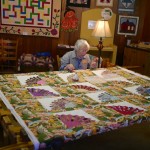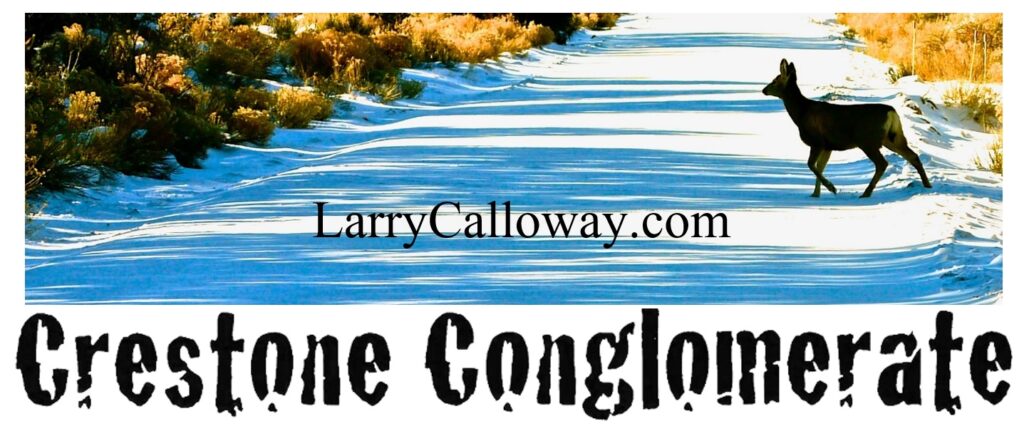Because much of the Ozark Mountains of Arkansas is federal, all the campgrounds were closed, so we found ourselves checking-in at the Dogwood Motel in Mountainview (pop. c. 3000). The young man at the desk recommended a catfish restaurant and the Ozark Culture Center north of town.
Catfish needs no definition. Even anthropologists argue endlessly about culture, but at the proud little state park culture is about music and storytelling and broom making and copper annealing and dress making and wood carving and wool carding and weaving and cigar-box guitars and letter-press printing and quilting. You go from studio to studio where exhibitors show how things were done, as musicians in a pavilion outside sing old-timey songs. Bill Clinton visits here often, they say.
 The printer caught my interest, the quilter, Pat’s. I was reminded how much work it took to hand-set type and justify it and make the impressions right. A printer apprenticeship was five years. The foot-treadle press must have been satisfying work because the printer, not the machinery, was in control of the speed and the paper feeding. The quilter showed Pat how to design and sew a “log cabin” patch, a square that has dark colors in one corner giving way to light colors in the opposite corner — like the cold side and the fire side of a log cabin.
The printer caught my interest, the quilter, Pat’s. I was reminded how much work it took to hand-set type and justify it and make the impressions right. A printer apprenticeship was five years. The foot-treadle press must have been satisfying work because the printer, not the machinery, was in control of the speed and the paper feeding. The quilter showed Pat how to design and sew a “log cabin” patch, a square that has dark colors in one corner giving way to light colors in the opposite corner — like the cold side and the fire side of a log cabin.
There were two restored one-room cabins with stone fireplaces, and I liked them. I could imagine a family — father repairing his flintlock rifle, mother cooking grits, children practicing reading — flourishing under the right conditions. These would have to include the prosperity of owning sustainable farmland, the freedom of living in the wilderness and the peace of open space with distant neighbors.
The young motel clerk — son of the owners — also recommended that there might be people playing music behind the court house that night, a Friday. What we found was amazing. The musicians were in a half dozen clusters all around the park behind the old stone building. They stood or sat on folding chairs facing each other in tight circles, playing, singing. Their instruments were guitars, mandolins, banjos, fiddles and even a washtub bass. The listeners gathered around them in larger circles, and many brought chairs. Folks listened and applauded. There was no drinking or smoking.
I associate live music with stage shows — towering loudspeakers, thousand-switch mixers, colored lights, crazed groupies — a created duality of performers and intimidated audience. Here in the Mountainview park in the dim light, it was all about unity and connection. I mean, the musicians would talk between songs and take requests from the listeners, and the scattered music cells did not interfere with each other.
We dragged our camp chairs from the car and sat with about 100 people around a group of old guys in caps. Most of them had guitars and strummed simple cord progressions in rhythm. They took turns signing, often discussing the songs — “Who wrote that?” “That’s your version, ain’t it, Roy?” Most of their songs were “country,” but of the old kind that I would call laments:
“You turned the love flame down to low.
“If you wanted to break my heart, you don’t have far to go.”
In the sixties enterprising musicians searched the mountains of the south for “folk” music, and the result was profitable. The new Cohen Brothers film, “Inside Llewyn Davis,” is about a Greenwich Village kid trying to make it as a folk singer, and it involves a subtle critique of the conflict between the urban sophisticates and the folks whose music they stole. I imagine experts in the genre would reject most of what we heard in the park as authentic. But I think the songs that everybody knows are folk culture, regardless of content. In other words, a culture is everything you need to know — from quilting to singing — to be part of a society. I could not doubt the authenticity of what we saw and heard in Mountainview.
Now, you can rightly ask what all this has to do with the focus of my journal of the South. Namely, God. And that’s where Gospel music comes in. We heard it mixed with the country music, and everybody knew the Gospel songs too. I think they shared the belief, felt the Spirit, as they gathered in their circles in the park. Everybody knew and felt this one sung by one of the old guys in caps:
“Will the circle be unbroken bye and bye, Lord, bye and bye?
“There’s a better land awaiting in the sky, Lord, in the sky.”
I love this chorus from the song about a son watching the hearse carrying his mother drive away because of its humility. It dictates nothing. It asks a question. The circle. . . .
As we drove on south through Louisiana toward New Orleans, some commentators on the radio reported that U.S. Rep. Michele Bachmann and other Church Republican politicians were again declaring “the end of times.” In other words, the Rapture, the Judgement, even the Return, are at hand, the politicians say. The thought of this dreary, guilt-producing rhetoric based on selective reading of the bible by public figures who seem to have appointed themselves as agents of God made me look forward to the refuge of the Big Easy.
Well, Bourbon Street is now more sleaze than jazz. Faux whores lean in doorways of strip joints. The once-famous drinks are now machine-made “frozen” slushes that are hard to finish. We sought cleaner streets and rode the street car named St. Charles and ate seafood at Two Sisters and tried to get into Preservation Hall.
What’s been preserved there is jazz, the music of free African Americans in New Orleans, an essential part of a culture that influenced the world. It was religious as the music of funeral processions, and it was joyful. We could not get in to Preservation Hall. There was a concert, and it was sold out. I had hoped for the old days when you just walked in and stood and listened to whatever group had assembled. A sign on the wall said, “Requests $1. Saints $5.”
I wanted to hear the old spiritual song that to me expressed what religion ought to be. The chorus was this:
“I sing because I’m happy.
“I sing because I’m free.
“His eye is on the sparrow.
“And I know he watches me.”

Nice Larry. Thanks for the images and the music.
Thanks, Larry.
Enjoyed reading this evocative sketch, Larry.
I was in W. Virginia in the spring and experienced a similar musical event in the back of a general store. Wonderful amateur musicians. Appreciate audience.
Sue
my dad emailed me this link,,,,somethin bout you taught him a thing or two bout a thing or two.
well, now, me too
thanks